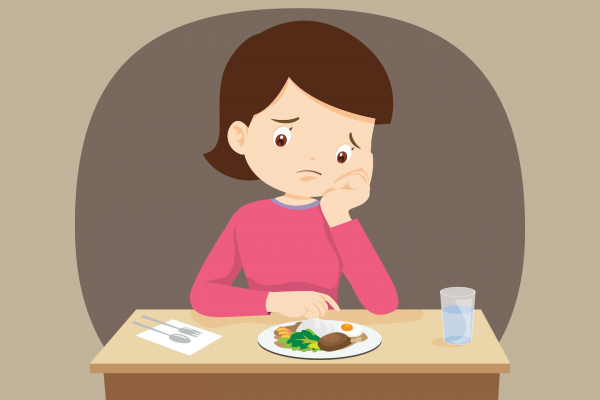How, when and what you eat can ease symptoms
Nausea is a common side effect during cancer treatment. It can occur after surgery due to general anesthesia or during treatments such as chemotherapy, radiation or other medications. It is important to keep in contact with your medical team and address nausea right away. Your doctor may prescribe anti-nausea medications, and it is important to take them as prescribed to help reduce your symptoms.
If you are nauseous, you may not be able to eat enough or eat foods with the most nutritious value, which can lead to unintended weight loss, muscle mass loss and malnutrition. Check out this article for easy ways to increase your calorie intake during cancer treatment. Tips to lessen or prevent nausea:
- Eat slowly and sit upright while you eat and for at least one hour after eating.
- Eat small portions more frequently throughout the day rather than trying to eat a few full meals.
- Rinse your mouth with water or a homemade rinse (see below for recipe) before you eat.
- Avoid foods that are spicy, fried, greasy, high in fat or high in fiber, as well as rich desserts, alcohol and caffeine.
- Keep a bland snack like crackers by your bed to eat before you get up if you typically experience nausea in the morning.
- Avoid eating 1-2 hours before your treatment if you experience nausea during chemotherapy or radiation treatment and seek bland, soft foods on treatment days. Some options include bananas, applesauce, eggs, yogurt, peanut butter, clear soups, white bread or toast, rice, pasta, crackers or potatoes.
Sensitivity to smells
Sometimes nausea can be caused by a sensitivity to smells of foods and beverages. If that is the case for you, try these tips:
- Use a cup with a lid for beverages with odors
- Choose cold or room-temperature foods as hot foods produce more odors.
- Eat in a well-ventilated room
- Have someone else prepare food for you and avoid the kitchen area while food is being prepared, if possible.
Have more nutrition questions?
Our nutrition team plays an important role in your care — before, during and after treatment.
Learn MoreShould I take supplements for nausea?
There are currently no supplements that are recommended to manage nausea. However, foods, beverages and candies with ginger may help reduce the symptoms. Additionally, if some of your nausea comes from having a bad taste in your mouth, sucking on a peppermint or lemon candy may help. Some vitamin and mineral supplements may contribute to nausea, so be sure to discuss any supplements you take with your doctor and registered dietitian.
Additional considerations
- Avoiding dehydration. If you are not eating and drinking enough due to nausea, you may become dehydrated. Watch for signs of dehydration such as headache and increasing nausea. Try sipping fluids that contain carbohydrates throughout the day to help prevent these symptoms.
- Watching for low blood sugar. If you are taking insulin or medications to control your blood sugar levels, you may need to have your medications adjusted if your food or drink intake decreases significantly in order to avoid hypoglycemia (low blood sugar levels). Tell your medical team if you can’t tolerate food or beverages for 24 hours.
Homemade Mouth Rinse
1 cup warm water
¼ teaspoon salt
¼ teaspoon baking soda
Mix well. Swish in mouth for 15 seconds and spit out.



